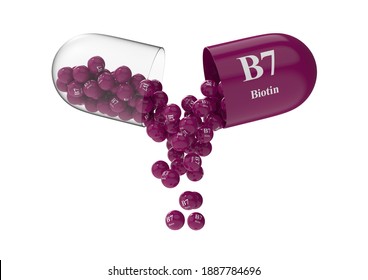Skin & Esthetics
WHAT IS BIOTIN ?
By A.A. (staff writer) , published on October 04, 2021

Medicine Telehealth Health BIOTIN health benefits of biotion
Biotin is commonly called vitamin B7 and vitamin H.it metabolizes fats, proteins, and carbohydrates in the body because it is a water-soluble vitamin. It is essential to take water-soluble vitamins because they are not stored in the body. Human cells cannot produce vitamin B7, although it is created by bacteria in the body and found in a variety of foods. Some medical diseases may benefit from the use of biotin. Some people use vitamin supplements for improving their nails and hair health, but there is no evidence that this is effective1.
Biotin is a member of the vitamin B family, which is a water-soluble vitamin. Biotin is also called vitamin H. Biotin is required by your body to aid in the conversion of certain nutrients into energy. It is also essential to keep your hair, skin, and nails healthy. You may suffer from conditions like hair loss or a scaly red rash if you don't get sufficient biotin. On the other hand, biotin deficiency is uncommon. The biotin you obtain from your food is usually enough to fulfill the health benefits it provides. Many people still try to get more biotin to get more benefits.
Research, biotin and hair growth
The basic protein of skin, nails, and hair is keratin. Biotin is known to enhance the infrastructure of the body's keratin. However, the role of biotin in skincare and hair health is unclear.
There is very little study on the impact of biotin on hair development. Increased biotin intake may encourage hair development, although there is just minimal data to support this claim. In the latest research, evidence supporting that biotin promotes hair development is limited, as supplements contain not only biotin but also other substances. Biotin cannot be recognized solely for the increase in hair growth2.
Health benefits
Hair Growth
According to the manufacturers, the presence of biotin in creams, hair oils, conditioners, and masks can make your hair shiny, increase fullness and make your hair thicker. In people having alopecia or deficiency of biotin using supplements of biotin increases hair regrowth.
However, researchers point out that hair regrowth can be triggered by a variety of reasons, including supplementation of biotin. Moreover, there is no proof that biotin supplementation is beneficial for persons whose hair is thinning due to an underlying problem3.
Lowering blood glucose
The ability of biotin to reduce blood sugar levels in both type 1 and type 2 diabetes was evaluated in many studies. The outcome of those studies was satisfactory. According to clinical trials in animals, biotin increases insulin secretion from the pancreas and thus reduces blood glucose levels.
Biotin may help individuals with type I diabetes to maintain their blood sugar levels, as per a research published in 2016. More research is required to confirm the effects of biotin on blood sugar levels.
Controlling neuropathy
Biotin has a role in reducing nerve damage in patients undergoing dialysis due to kidney disease or in diabetic patients. The data from a clinical study conducted in 1990, shows that taking higher doses of biotin for 1 to 2 years can reduce the symptoms of neuropathy. Pyruvate carboxylase requires biotin to function properly. High levels of pyruvate and aspartate may result if this is not done, which might be dangerous for neurons. More research is required to confirm this.
Supporting pregnancy and breastfeeding
Pregnant and lactating mothers can also take biotin. Low biotin levels are prevalent during pregnancy, notwithstanding the rarity of clinical biotin deficiency. In fact, it's estimated that half of all pregnant women in the United States have a moderate deficiency. This amount of insufficiency may have an impact on a person's health, but is not sufficient to cause symptoms.
According to healthcare experts, the deficiency of biotin is common among pregnant ladies, because during pregnancy the body rapidly breaks down the vitamin. That's why pregnant ladies need more biotin from diet and from supplements, as compared to non-pregnant ladies. It is essential to talk to your doctor or nutritionist before using any supplements during pregnancy and breastfeeding4.
Dosage, Preparation, and Safety
There is no recommended daily dose for biotin from the FDA. The daily dose of 30 micrograms (mcg) is sufficient for individuals aged 19 and above, as per the instructions of the National Institutes of Health. This quantity is generally obtained from the diet.
Those who advocate for its use frequently advise taking 2 to 5 milligrams (mg) of biotin daily as a supplement to strengthen hair and produce results. Despite the fact that biotin is a water-soluble vitamin (a high amount is eliminated in urine and feces), the safety of supplementing with any dose of biotin remains uncertain. Biotin hasn't been proven for safety in pregnant women, nursing mothers, children, or people with health problems or who are taking other supplements or medicines5.
References
- Why do we need biotin (vitamin B7)? [Internet]. [Cited 2021 August 06 ]; Available from https://www.medicalnewstoday.com/articles/287720
- Biotin for Hair Growth: Does It Work? [Internet]. [Cited 2021 August 06 ]; Available from https://www.healthline.com/health/biotin-hair-growth#research
- The Health Benefits of Biotin. [Internet]. [Cited 2021 August 06 ]; Available from https://www.verywellhealth.com/biotin-for-hair-growth-89236
- Why do we need biotin (vitamin B7)? [Internet]. [Cited 2021 August 06 ]; Available from https://www.medicalnewstoday.com/articles/287720#health-benefits
- The Health Benefits of Biotin. [Internet]. [Cited 2021 August 06 ]; Available from https://www.verywellhealth.com/biotin-for-hair-growth-89236
Find articles related to: Medicine Telehealth Health BIOTIN health benefits of biotion
More articles about Skin & Esthetics
Back to the Health Tips Index




